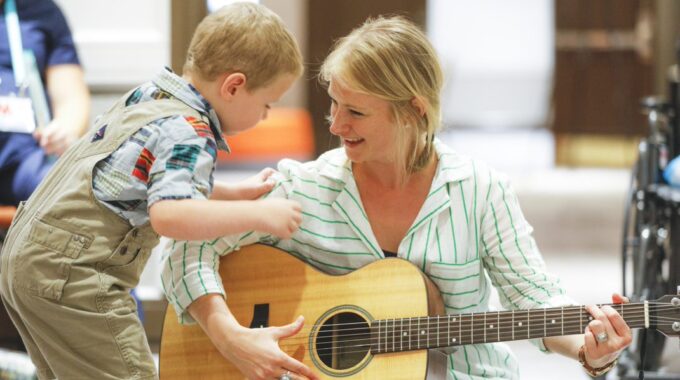“Even when children seemed to be ‘locked-in,’ music could find a way in.”
Rebecca Atkinson, researcher at the University of Brighton and Director of Chiltern Music Therapy tells how music therapy programmes have helped children with Batten disease
I remember the first time I met a child with Juvenile Batten disease. Her family sat with me and described their devastating journey of the disease. Firstly, they had noticed her bumping into things at the age of ten years old, and then within two years she was blind, had little speech remaining, and they were watching their daughter deteriorate before their eyes.
Yet in those first moments of meeting the family, her parents described moments in their daughter’s day where she seemed to be completely transformed. When she listened to music, despite having little conversational speech, she could sing and recite songs perfectly. She could remember song words, sing them in time to the music and a window of clarity emerged where her family could hear her voice again. Through meeting more children with Batten disease and their families around the world it seemed that even when children seemed to be ‘locked-in’, music could find a way in.
The research I am running with the University of Brighton aims to unlock the potential of music for children with Batten disease. Over the course of five years, I have been observing children in music therapy and in school tracking how they respond to music. Findings have shown that children’s communication appears to be maintained when they have weekly music therapy or music education sessions.
I then went on to develop a music therapy education programme for teachers and staff to use in class, to see if music therapy techniques could be woven into a child’s school day. The Music Speaks programme took elements of music therapy to help children practice how to pace their speech to music and remember key words and phrases to help them as their language deteriorated. Findings showed that from using Music Speaks, children learned how to slow their speech down using the rhythm in the music and they learned to use musical phrases to help support their communication. As well as empowering children with Batten disease the programme also gave staff the confidence to support children’s communication through music on a more general basis in the classroom.
Schools also saw how the programme could help children learn key phrases through which could help them maintain their communication for longer into the future.
The research suggests that music therapy-based programmes could provide a much-needed resource for professionals and schools, tapping into the neurological, emotional and physical impact of music. I also hope that this research can offer valuable ways for educators, therapists and families to connect with children through music. I have seen how music can in some way help alleviate the harrowing symptoms of the disease, even if only for a single moment, and I hope this research will go some way in improving the quality of life for children who are living with the disease every day.
The final research report will be shared with the BDSRA and the international Batten disease community, to help support affected children, their families and educators with musical activities, ideas, and resources. In the meantime, local music therapy services can be found through the British Association of Music Therapy or by contacting larger music therapy organisations in the UK. You can also get in touch with me by emailing (info@chilternmusictherapy.co.uk).

